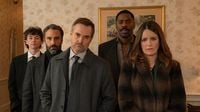In a world where relationships often face the test of time, Netflix's new miniseries, The Four Seasons, offers a refreshing yet poignant look at the complexities of marriage and friendship. This adaptation of Alan Alda's 1981 film, co-created by Tina Fey, Lang Fisher, and Tracey Wigfield, brings a modern twist to the classic tale of three couples navigating the ups and downs of their intertwined lives.
Set against the backdrop of four seasonal getaways, the story revolves around three couples: the critical yet caring Kate (played by Fey) and her gentle husband Jack (Will Forte), the troubled Nick (Steve Carell) and his wife Anne (Kerri Kenney-Silver), and the open-minded Danny (Colman Domingo) and his emotional partner Claude (Marco Calvani). Their friendships are tested when Nick announces his decision to leave Anne during their 25th wedding anniversary celebration at a lakeside retreat.
As the series unfolds over eight episodes, viewers are treated to a rich tapestry of humor and drama, exploring how each couple copes with the fallout of Nick's announcement. The first trip to the lakehouse in spring sets the stage for the ensuing turmoil, where tensions rise as Nick reveals his plans to divorce Anne, shocking their friends and altering the dynamics of their relationships.
Each subsequent trip—summer at an eco-friendly resort, fall at a liberal arts college, and winter in a snowy chalet—serves as a pressure cooker for the characters, forcing them to confront their own marital issues. The show cleverly uses these vacations to highlight the contrasts between the couples, revealing the cracks in their relationships while also showcasing the strength of their bonds.
Fey's portrayal of Kate is particularly notable, as she embodies the struggles of a woman grappling with the imperfections of her marriage. Her character's relationship with Jack is marked by a mix of affection and frustration, encapsulated in moments of biting humor and heartfelt exchanges. One standout line from Kate, "Everyone else gets the top-shelf version of your personality," resonates deeply, illustrating the challenges faced in long-term relationships.
Meanwhile, Nick's midlife crisis is portrayed with a blend of humor and empathy. Carell's performance captures the vulnerability of a man seeking to reclaim his youth through a relationship with the much younger Ginny (Erika Henningsen), who complicates the existing dynamics within the friend group. The comedic tension between Nick and Ginny, especially as they navigate the awkwardness of their age difference, adds a layer of complexity to the narrative.
One of the most significant updates in this adaptation is the inclusion of a gay couple, Danny and Claude, whose open relationship challenges traditional norms. This modern twist not only reflects contemporary relationship dynamics but also enriches the overall narrative, allowing for a broader exploration of love and commitment.
However, the series doesn't shy away from the darker aspects of relationships. In a shocking turn of events, Nick dies in a car accident at the end of Episode 7, a plot twist that serves as a catalyst for the remaining characters to reevaluate their lives and relationships. This unexpected development adds emotional weight to the series, prompting the characters to confront their grief and the impact of Nick's choices on their friendships.
The finale, titled "Fun," sees the characters grappling with the aftermath of Nick's death as they attempt to honor his memory while navigating their own emotional turmoil. The portrayal of Anne, who must come to terms with her feelings of loss and betrayal, is particularly poignant. Kenney-Silver delivers a nuanced performance, capturing the complexities of a woman facing the end of a long marriage while also trying to find a path forward.
Throughout the series, the chemistry among the cast is palpable, with Fey, Carell, Domingo, and Henningsen delivering standout performances that elevate the material. The dialogue is sharp and witty, often reflecting the characters' shared history and the weight of their experiences. The series successfully balances humor with heartfelt moments, creating a relatable portrayal of adult friendships and the challenges of maintaining them over time.
Despite some criticism regarding its tonal shifts and pacing, The Four Seasons ultimately succeeds in delivering a thoughtful exploration of marriage, friendship, and the complexities of human relationships. The series reminds viewers that love is not always easy and that the bonds we forge with others can be both a source of comfort and a catalyst for conflict.
As the characters navigate their evolving relationships, they learn that while marriage requires work, it is also filled with moments of joy and connection. The show serves as a reminder that even in the face of adversity, the support of friends can make all the difference in weathering life's storms.
With its engaging storytelling and relatable themes, The Four Seasons is a timely addition to the landscape of contemporary television, inviting viewers to reflect on their own relationships and the importance of nurturing them through all of life's seasons.





